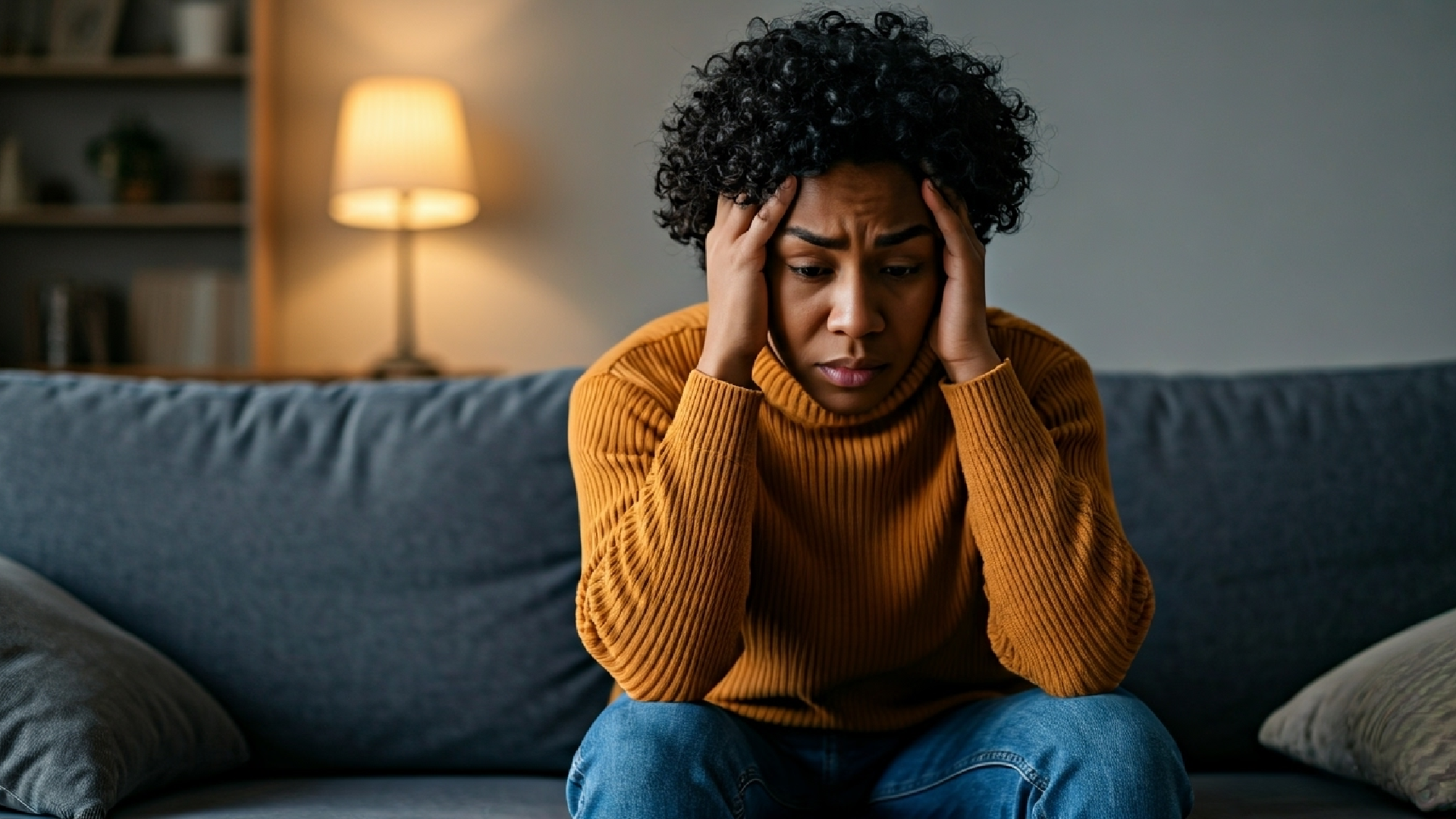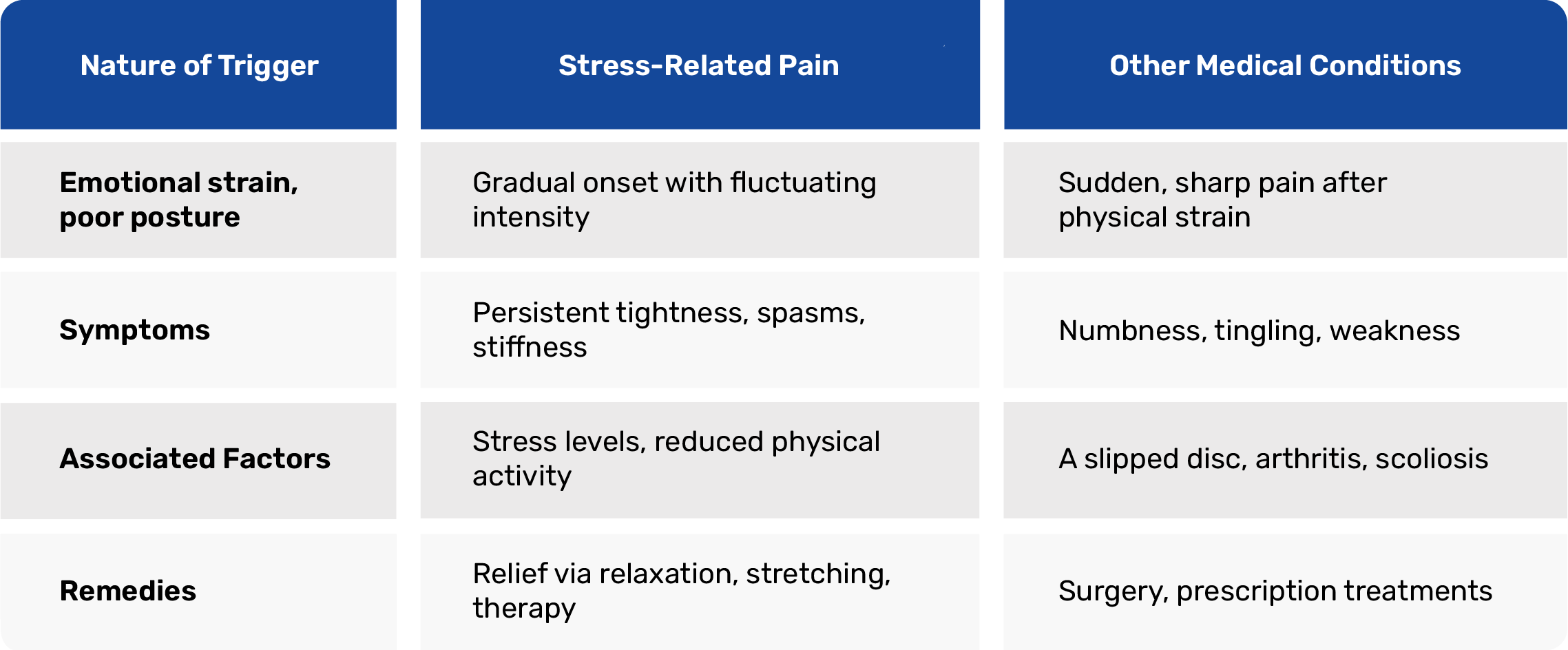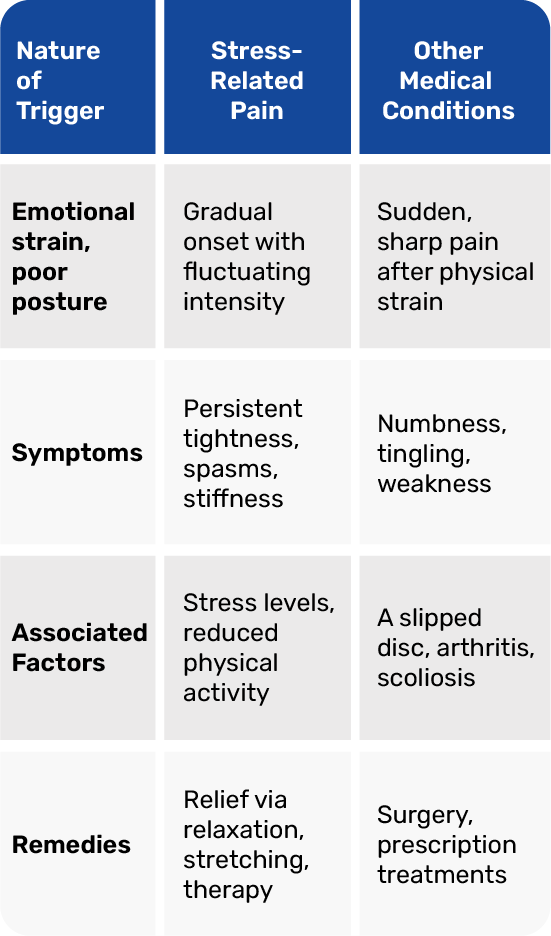
Stress can cause your muscles to tighten, often leading to back pain, particularly in the lower back.
When stress levels are high, it can alter how blood flows, and this may lead to stiffness or discomfort in your back muscles.
If you live with stress for a long time, it can affect your body’s way of handling swelling and pain. This can lead to damage in cells and tissues, which sometimes manifests as long-lasting, chronic pain.
Back pain from stress often starts slowly. It can get better if you try relaxation techniques, such as deep breathing or meditation.
Poor posture is typical during periods of stress. This can exacerbate pain in your mid-back and neck, worsening the problem.
When you are stressed, you may move less. Not getting enough physical activity can exacerbate lower back pain. That is why it is essential to stay active, as it helps maintain the health of your back muscles and posture.
Back pain is something that many people feel every day. The link between stress and back pain is not always clear to everyone. When you have high stress levels, your muscles tighten. This can disrupt how your body moves and functions. Over time, this muscle tension may turn into ongoing discomfort and chronic pain. The middle and lower back are often where people feel it the most. If you do not do anything about it, the stress and pain keep making each other worse. This creates a vicious circle. When your back hurts, you feel more stressed. When you are more stressed, your pain can get even worse. Understanding how this happens can help you take more effective steps to manage back pain.
Now, let’s look at what stress does to your back and how you can fight back against it.
Stress and back pain are connected. One often makes the other worse. High stress levels trigger your stress response to activate. This stress response releases cortisol in your body. It also lowers blood flow to your back muscles. When this happens, the muscles in your lower back get tense. They feel stiff, and you may start to feel discomfort there.
Chronic stress is even more troubling. Over time, it changes the body’s inflammatory response. This can lead to tissue degeneration and oxidative stress, making back pain stay around for longer and even get worse. To stop this cycle, it is important to know what stress triggers set off your back pain. When you figure this out, you can take steps to prevent things from getting worse.
Stress can cause numerous problems in the body. When you feel stressed, your body responds strongly. Cortisol levels increase, and your muscles become tense. This is the stress response, which prepares your body to fight or flee. If your muscles stay tense for a long time, you might notice stiffness and more pain, especially in the lower back.
Stress also causes blood vessels to constrict. This means less blood flows to your back muscles. When that happens, you can get soreness and muscle spasms. Since less blood is moving, your muscles and other cells do not get enough oxygen. Without this, they do not work as well, so you heal more slowly. You experience pain and discomfort for an extended period.
If you have chronic stress, your cortisol levels can get all mixed up. This can disrupt your body’s natural response to swelling and pain, potentially leading to further damage and tissue wear in the back. Problems like oxidative stress and tissue degeneration can come up if stress is not managed. Not only does this harm your back, but you can also get other physical symptoms like headaches and feeling very tired.
You need to handle the physical side of stress. If you do, you may prevent low-back pain from worsening, and your body will function better overall.
The mind and body are closely linked when it comes to back pain. Emotional stress can cause the back muscles to become even more tense. This tension in the muscles often makes back pain worse. Over time, if you have a lot of stress, your pain tolerance goes down. So even a little discomfort in your back can feel much worse.
When you feel stressed, the limbic system in your brain becomes overly active. This messes up how your body balances certain brain chemicals. It brings more inflammation and tissue degeneration. As a result, individuals may experience ongoing back pain, headaches, or other persistent issues.
If you are under stress for an extended period, your body may not heal injuries as effectively. The back muscles may often spasm and feel stiff most of the time. Using mindfulness or finding ways to relax can help break this cycle. Taking care of your well-being and calming your mind can help ease chronic back pain. This also helps your body heal from tissue damage.
Stress-related back pain often shows up when stress levels go up. It comes with mild physical symptoms. The pain may not start all at once. Instead, it can build up over time and worsen as the stress increases.
If your back pain changes with how much stress you feel, and it is not always the same level of pain, stress might be the reason. Back pain that improves after you take steps to lower stress also suggests that stress is the underlying cause. Noticing these early signs can help you determine if the back pain is caused by stress or if it’s related to something else affecting your body or health.
Stress-induced back pain manifests in various ways. These symptoms often come from muscle tension in the back. Here are some common ones:
Stress pain is not the same as pain from an injury. Stress-related symptoms can vary depending on your emotional state and may improve when you practice relaxation techniques. These could be deep breathing or meditation. It helps to notice these signs so you can determine if stress is a contributing cause of your back pain or muscle tension. Relaxation, deep breathing, or meditation may lower your discomfort and improve your mobility.
Differentiating stress-related back pain from other types of back pain requires examining your triggers, symptoms, and lifestyle. The table below shows what makes each kind stand out:


It is best to consult an orthopedic spine surgeon if your symptoms persist and do not improve. This can help rule out other health problems and medical conditions. Back pain from stress often improves when you use stress management techniques, improve your posture, engage in physical activity, and make time for relaxation. The key is to identify the type of pain you have to receive the right help. Stiffness or pain that persists requires special care to help you feel better again.
Managing stress is important to help with back pain and to improve your quality of life. Physical activity helps strengthen your back muscles. It also boosts endorphins, which can help reduce discomfort and worry.
Relaxation techniques, such as deep breathing and meditation, help the body respond less to stress. This brings relief from tension. Combining physical activity with relaxation techniques provides a more comprehensive approach to managing back pain. Focusing on these practices is beneficial for your flexibility and posture, and it can also help you move more efficiently day to day.
Using relaxation techniques and lifestyle changes can help lower stress levels and back pain:
If you eat healthier and stay regular with some physical activity, these ways can work even better. It can help lower stress and alleviate back discomfort.
If you still have back pain even after dealing with stress, you should see a doctor. Chronic pain may indicate the presence of underlying medical conditions that require further evaluation.
Physical therapy can help you with this by providing hands-on support to reduce tension in your back and assist in regaining your mobility. Therapists show you easy stretches that target the problem areas, and over time, this can help improve things. If you experience severe pain caused by inflammation or an injury, you may need counter-irritant pain relievers. You can get these from a general physician.
If your symptoms get worse, it’s important to talk to an orthopedic spine surgeon. They can use advanced tests to identify the issue and develop a tailored plan to help you feel better. Getting help early prevents things from getting worse and is beneficial for your overall health, posture, and mobility.
To sum up, understanding the connection between stress and back pain is crucial if you experience any discomfort. When you notice how stress manifests in your body, you can identify various signs, including back pain. This gives you the power to take control and work on relief. Try using relaxation techniques and making changes in your daily life. Doing this can help reduce the symptoms of stress. Always listen to your body. If you have pain that sticks around even after you handle stress, it’s good to go to a professional for help. Your well-being matters, so don’t wait to get support when you need it.
Yes, stress can make chronic back pain worse. High stress levels can lead to muscle tension and more inflammation in the body. Over time, this may cause tissue degeneration, particularly in the lower back. This can bring more discomfort, and it often worsens if you feel stressed for an extended period. To help alleviate lower back pain, it is essential to manage your stress effectively. This can make a significant difference in how you feel over time.
Try using heat therapy with a heating pad to help relieve discomfort in your back muscles. You can also practice deep breathing or use massage on the area. These ways help take away tension in your back and make it easier to move. You will feel relief fast when you go through stressful times.
Yes, stress-related back pain is common in India. Many people here lead busy routines and engage in insufficient physical activity. The lower back is often where people feel this pain. This usually happens when you do not move enough. That is why it is essential to incorporate more physical activity into your daily routine. Simple relaxation techniques can help your body and mind. With regular movement and a focus on relaxation, you can better manage your back pain.
Stress relief can start to help with back pain in just a few days or weeks. Using relaxation techniques and engaging in physical activity can help reduce muscle tension and improve your overall well-being in day-to-day life. If back pain persists, it is a good idea to consult a doctor for a checkup. This can help determine if there is a more significant stress issue or another underlying cause of the pain, such as an injury.
If you still have back pain after trying to reduce stress, it could mean that there are other medical conditions. You should talk to an orthopedic spine surgeon. They can check for conditions such as disc injury, inflammation, or other health issues that may require specialized treatment.

Pioneering Interventional Pain Management
Delhi | Faridabad | Gurugram | Ghaziabad | Noida | Lucknow | Jaipur | Mumbai
© 2025 Nivaan. All Rights. Reserved